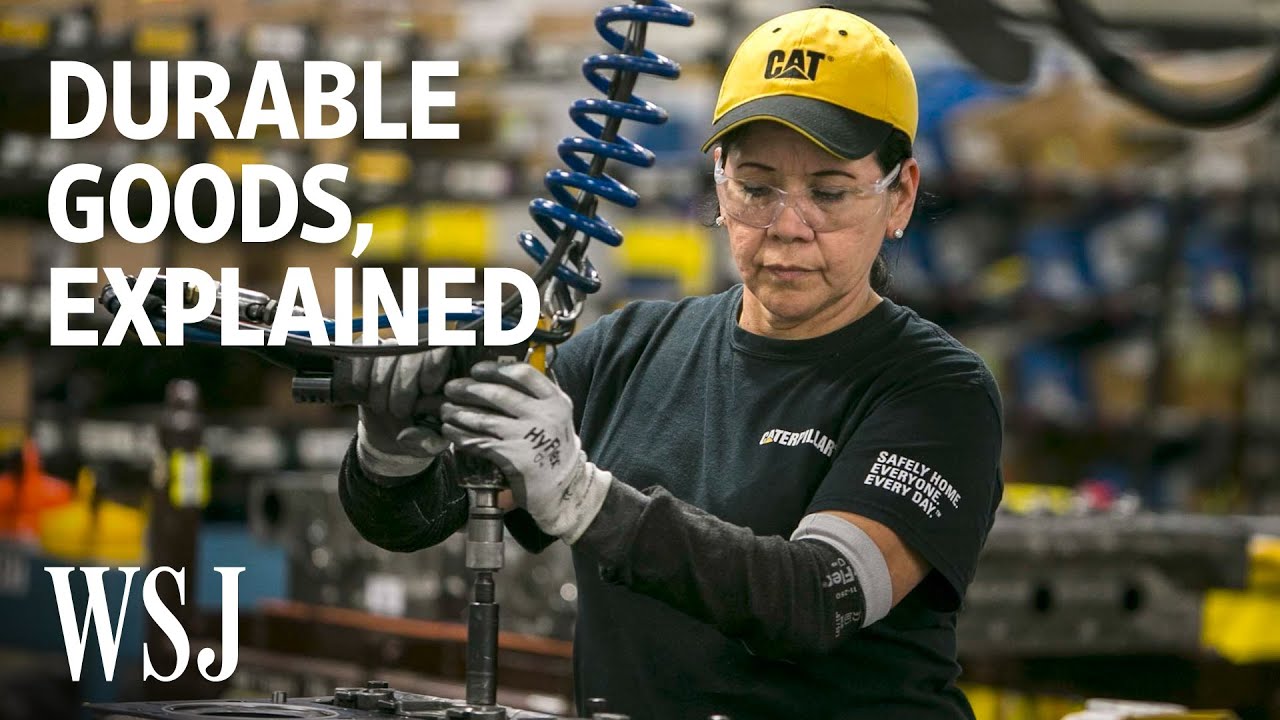The consumer durables field encompasses a wide range of products that are designed to provide utility and comfort to individuals for an extended period. In this article, we will explore what companies are in the consumer durables field.
From electronics to appliances and furniture, consumer durables are an integral part of our everyday lives. Within this industry, several companies have emerged as leaders, delivering innovative and high-quality products to meet the diverse needs and preferences of consumers.
What Are Durable Goods?

What are Durable Goods?
Durable goods refer to tangible products that have a long lifespan and are used by individuals or businesses for an extended period. These goods are typically characterized by their ability to withstand repeated use or wear and tear without significant deterioration in their functionality or physical condition. Durable goods are distinct from non-durable goods, which are consumed or used up relatively quickly. Examples of durable goods include:
- Appliances- Refrigerators, washing machines, dishwashers, ovens, and vacuum cleaners.
- Electronics- Televisions, computers, smartphones, audio systems, and gamingconsoles.
- Furniture- Sofas, beds, tables, chairs, cabinets, and desks.
- Vehicles- Cars, motorcycles, bicycles, and recreational vehicles.
- Tools and Machinery- Power tools, gardening equipment, industrial machinery, and construction equipment.
- Home Improvement Products- Flooring, windows, doors, roofing, and lighting fixtures.
- Sports and Fitness Equipment- Treadmills, exercise bikes, weights, and sports gear.
- Musical Instruments- Guitars, pianos, drums, violins, and brass instruments.
Durable goods are typically more expensive compared to non-durable goods due to their long lifespan and potential for extended use. Consumers often make considered purchasing decisions when buying durable goods, taking into account factors such as quality, performance, features, and price.
What Companies Are In The Consumer Durables Field?
The consumer durables field encompasses a wide range of companies involved in the manufacturing, distribution, and retail of durable goods. Here are the different types of companies typically found in the consumer durables field:
- Electronics Manufacturers- Companies that specialize in the production of consumer electronics, including smartphones, televisions, audio systems, computers, cameras, and gaming consoles.
- Appliance Manufacturers- Companies that design and manufacture home appliances such as refrigerators, washing machines, dishwashers, ovens, microwaves, air conditioners, and vacuum cleaners.
- Furniture Manufacturers - Companies that produce various types of furniture, including sofas, beds, tables, chairs, cabinets, desks, and outdoor furniture.
- Automobile Manufacturers- Companies involved in the production of durable goods like cars, motorcycles, bicycles, and other motor vehicles.
- Power Tool Manufacturers- Companies that manufacture power tools and equipment used in construction, woodworking, gardening, and other applications.
- Home Improvement Companies- Companies that provide products related to home improvement, including flooring, lighting fixtures, windows, doors, roofing materials, and bathroom/kitchen fixtures.
- Sports and Fitness Equipment Manufacturers- Companies that produce sports equipment, fitness machines, exercise bikes, treadmills, weights, and other fitness accessories.
- Musical Instrument Manufacturers- Companies involved in the manufacturing of musical instruments such as guitars, pianos, drums, violins, and brass instruments.
- Security Systems Manufacturers- Companies that specialize in manufacturing security systems, including alarms, surveillance cameras, access control systems, and smart home security devices.
- Kitchenware and Cookware Manufacturers- Companies that produce kitchen appliances, cookware, bakeware, cutlery, and other kitchen utensils.
Additionally, there are companies involved in retailing consumer durables through various channels, including brick-and-mortar stores, e-commerce platforms, and specialty retailers. These companies play a crucial role in connecting consumers with durable goods.
10 The Most Famous Durables Companies
The consumer durables field comprises a diverse range of companies that manufacture and distribute products designed for long-term use by individuals. Here are some notable companies in the consumer durables industry:
- Samsung Electronics- A global leader in consumer electronics, Samsung offers a wide range of products, including smartphones, televisions, home appliances, and audio systems.
- LG Electronics- Known for its innovative home appliances and consumer electronics, LG produces refrigerators, washing machines, televisions, smartphones, and audio systems.
- Whirlpool Corporation- Whirlpool is a renowned manufacturer of home appliances, including refrigerators, washing machines, ovens, dishwashers, and air conditioners.
- Panasonic Corporation- Panasonic manufactures and sells a wide array of consumer durables such as televisions, audio equipment, cameras, air conditioners, and home appliances.
- Sony Corporation- Sony is a prominent name in the consumer electronics industry, producing televisions, audio systems, gaming consoles, cameras, and smartphones.
- Haier Group Corporation- Haier is a Chinese multinational conglomerate known for its wide range of consumer electronics and home appliances, including refrigerators, washing machines, air conditioners, televisions, and kitchen appliances.
- Electrolux AB- Electrolux is a Swedish multinational company specializing in home appliances, offering products like refrigerators, ovens, washing machines, vacuum cleaners, and air purifiers.
- Philips- Philips is a Dutch multinational conglomerate focusing on electronics and healthcare. The company produces a variety of consumer durables, including televisions, audio equipment, lighting solutions, and personal care products.
- General Electric- General Electric is an American conglomerate involved in various industries, including consumer appliances such as refrigerators, dishwashers, ovens, and washing machines.
- Bosch- Bosch is a multinational engineering and technology company that manufactures a wide range of consumer durables, including home appliances, power tools, security systems, and automotive components.
What Are Durables And Why Are They Important?

Durable Goods and What They Say About the Economy | WSJ
Durables, also known as durable goods, are tangible products that are designed to have a long lifespan and provide utility and functionality over an extended period. They are intended for repeated use and can withstand wear and tear without significant deterioration. Examples of durables include appliances, electronics, furniture, vehicles, tools, and machinery. Durables are important for several reasons:
- Longevity and Value- Durables are built to last, offering extended usability and value for consumers. They are designed with durable materials and quality craftsmanship, ensuring that they can withstand regular use over a significant period.
- Utility and Convenience - Durables provide essential functions and convenience in our daily lives. They enhance our comfort, productivity, and overall quality of life by fulfilling various needs, such as cooking, cleaning, communication, entertainment, transportation, and more.
- Cost-Effectiveness- While durables may have a higher upfront cost compared to non-durables, their long lifespan and ability to endure repeated use make them cost-effective in the long run. Investing in durable goods can save moneyby reducing the need for frequent replacements or repairs.
- Sustainability and Environmental Impact- By using durable goods, we can reduce waste generation and environmental impact. Choosing durable products that last longer reduces the overall consumption of resources and minimizes the disposal of discarded items.
- Economic Impact- The production and sale of durable goods contribute significantly to the economy. The consumer durables industry provides employment opportunities, drives technological advancements, and stimulates economic growth through manufacturing, retail, and related sectors.
- Personal Expression and Lifestyle- Durables often reflect personal style and preferences, allowing individuals to express their tastes and create a living space that aligns with their lifestyle and values. Furniture, electronics, and home decor items, for example, contribute to the aesthetics and ambiance of a home.
Is The Consumer Durables Sector A Good Investment Choice?
Whether the consumer durables sector is a good investment choice depends on various factors, including individual investment goals, risk tolerance, market conditions, and specific companies within the sector. Here are some points to consider when evaluating the investment potential of the consumer durables sector:
- Stability and Longevity - The consumer durables sector tends to be relatively stable, as people continue to purchase durable goods even during economic downturns. Consumer spending on essential items like appliances and electronics often remains consistent.
- Innovation and Technological Advancements- Companies in the consumer durables sector often rely on innovation and technological advancements to stay competitive. Investing in companies that consistently introduce innovative products and adapt to changing consumer preferences can offer growth opportunities.
- Market Demand and Consumer Behavior- Understanding market demand and consumer behavior is crucial. Analyzing trends, consumer sentiment, and evolving preferences can help identify potential investment opportunities within the sector.
- Competition and Market Share- The consumer durables sector is highly competitive, with numerous companies vying for market share. It's essential to consider the competitive landscape and evaluate companies' ability to differentiate themselves and maintain or gain market share.
- Economic Factors- The performance of the consumer durables sector can be influenced by economic factors such as disposable income levels, consumer confidence, interest rates, and housing market conditions. Monitoring economic indicators and forecasts can help assess the sector's investment potential.
- Regulatory Environment- Changes in regulations related to consumer product safety, environmental standards, or import/export policies can impact companies in the consumer durables sector. Staying informed about regulatory developments is important for assessing investment risks.
It's important to conduct thorough research, evaluate financial statements, consider diversification, and consult with a financial advisor or investment professional before making any investment decisions. They can provide personalized guidance based on your specific financial situation, goals, and risk tolerance.
What Are The Latest Trends In The Consumer Durables Field?
Tracking The Demand Trends In Consumer Durables Sector : Nilesh Gupta & Praveen Sahay Exclusive
The consumer durables field is continually evolving, driven by advancements in technology, changing consumer preferences, and societal trends. Here are some of the latest trends shaping the industry:
- Smart Home Integration- The integration of smart technology into consumer durables is a significant trend. Smart appliances and devices offer connectivity and enhanced control through smartphone apps or voice assistants, allowing users to manage and monitor their home appliances remotely.
- Energy Efficiency and Sustainability- There is a growing emphasis on energy-efficient and environmentally friendly consumer durables. Manufacturers are developing products that consume less energy, utilize renewable resources, and incorporate sustainable materials to reduce the environmental impact.
- Internet of Things (IoT) Connectivity- The IoT is transforming consumer durables by enabling seamless connectivity between devices and the Internet. IoT-enabled appliances can offer features like remote monitoring, automated controls, and data analytics to optimize performance and user experiences.
- Voice-Activated Devices- Voice assistants, such as Amazon Alexa and Google Assistant, have gained popularity, leading to an increased demand for voice-activated consumer durables. From smart speakers to appliances with voice control capabilities, users can operate devices and access information through voice commands.
- Health and Wellness Focus- Consumer durables are increasingly incorporating features that promote health and wellness. Examples include smart fitness devices, air purifiers with advanced filtration systems, sleep-tracking technologies in mattresses, and ergonomic furniture designed for comfort and posture support.
- Personalization and Customization - Consumers are seeking personalized experiences, and this trend extends to consumer durables as well. Companies are offering customization options, allowing customers to tailor products to their specific preferences, such as color, design, or functionality.
- Augmented Reality (AR) and Virtual Reality (VR)- AR and VR technologies are being utilized in the consumer durables field to enhance the shopping experience. Customers can virtually visualize how furniture will look in their homes or experience products in immersive virtual environments before making a purchase.
- Artificial Intelligence (AI) Integration- AI is being integrated into consumer durables to improve functionality and user experiences. AI-powered features can include automated settings, intelligent sensors for optimized performance, personalized recommendations, and predictive maintenance.
- Enhanced Safety and Security- Safety and security features are becoming increasingly important. Consumer durables are incorporating technologies such as fingerprint or facial recognition, smart locks, advanced surveillance systems, and safety sensors to provide enhanced protection for users and their homes.
- Circular Economy Initiatives - The concept of a circular economy, focused on reducing waste and maximizing resource efficiency, is gaining traction in the consumer durables field. Companies are implementing strategies like product refurbishment, recycling programs, and take-back initiatives to extend the lifecycle of products and reduce environmental impact.
These are just a few of the latest trends in the consumer durables field. The industry continues to evolve, driven by technological advancements, environmental consciousness, and changing consumer needs.
People Also Ask
How Is The Consumer Durables Industry Performing?
The performance of the consumer durables industry can vary depending on various factors such as economic conditions, consumer demand, and market competition. However, the industry has generally shown resilience and growth due to increasing disposable incomes, technological advancements, and the constant need for durable goods.
What Factors Should I Consider When Buying Consumer Durables?
When purchasing consumer durables, several factors should be considered, including the product's quality, brand reputation, features, price, energy efficiency, warranty, after-sales service, and customer reviews. It's essential to assess your specific requirements and compare different options before making a purchase decision.
How Can I Ensure The Longevity Of Consumer Durables?
To ensure the longevity of consumer durables, it is crucial to follow the manufacturer's instructions for proper usage, maintenance, and cleaning. Regularly servicing and cleaning appliances, protecting electronic devices from power surges, using compatible accessories, and handling furniture with care can help extend their lifespan.
Are There Any Upcoming Trends In The Consumer Durables Industry?
The consumer durables industry is witnessing several trends. These include the integration of smart technology into appliances, increased focus on energy efficiency and sustainability, advancements in Internet of Things (IoT) connectivity, the rise of voice-activated devices, and the incorporation of artificial intelligence (AI) to enhance user experiences.
Conclusion
The consumer durables industry is driven by companies that consistently strive to provide consumers with reliable, innovative, and technologically advanced products. From global giants like Samsung and LG to established brands like Whirlpool and Panasonic, these companies have played a significant role in shaping the consumer durables landscape.
Through their commitment to quality, performance, and user-centric designs, these companies have earned the trust and loyalty of consumers worldwide. As technology continues to advance and consumer demands evolve, we can expect these companies, along with many others in the consumer durables field, to continue pushing boundaries and delivering products that enhance our daily lives.

